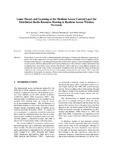| dc.contributor.author | Ayienga, Eric | |
| dc.contributor.author | Opiyo, Elisha | |
| dc.contributor.author | Manderick, Bernard | |
| dc.contributor.author | Odongo, Okelo | |
| dc.date.accessioned | 2013-02-13T11:56:14Z | |
| dc.date.issued | 2013-02-13 | |
| dc.identifier.uri | http://erepository.uonbi.ac.ke:8080/xmlui/handle/123456789/9764 | |
| dc.description.abstract | Game theory is not only useful in understanding the performance of human and autonomous game players, but it is also widely employed in solving resource allocation problems in distributed decision-making systems. Reinforcement learning is a promising technique that can be used by agents to learn and adapt their strategies in such systems. We have enhanced the carrier sense multiple access with collision avoidance mechanism used in random access networks by using concepts from the two fields so that nodes using different strategies can adapt to the current state of the wireless environment. Simulation results show that the enhanced mechanism outperforms the existing mechanism in terms of throughput, dropped packets and fairness. This is especially noticeable as the network size increases. However the existing mechanism performs better in terms of delay which can be attributed to increased processing. | en |
| dc.description.sponsorship | University Cooperation for Development of the Flemish Interuniversity
Council (VLIR-UOS-IUC) Project and the University of Nairobi. | en |
| dc.language.iso | en | en |
| dc.subject | Distributed Channel Sharing: Random Access: Medium Access Control: Game Theory: Strategy: Exploration: Reinforcement Learning: Q-learning. | en |
| dc.title | Game Theory and Learning at the Medium Access Control Layer for Distributed Radio Resource Sharing in Random Access Wireless Networks | en |
| dc.type | Article | en |
| local.embargo.terms | forever | en |
| local.embargo.lift | 10000-01-01 | |

